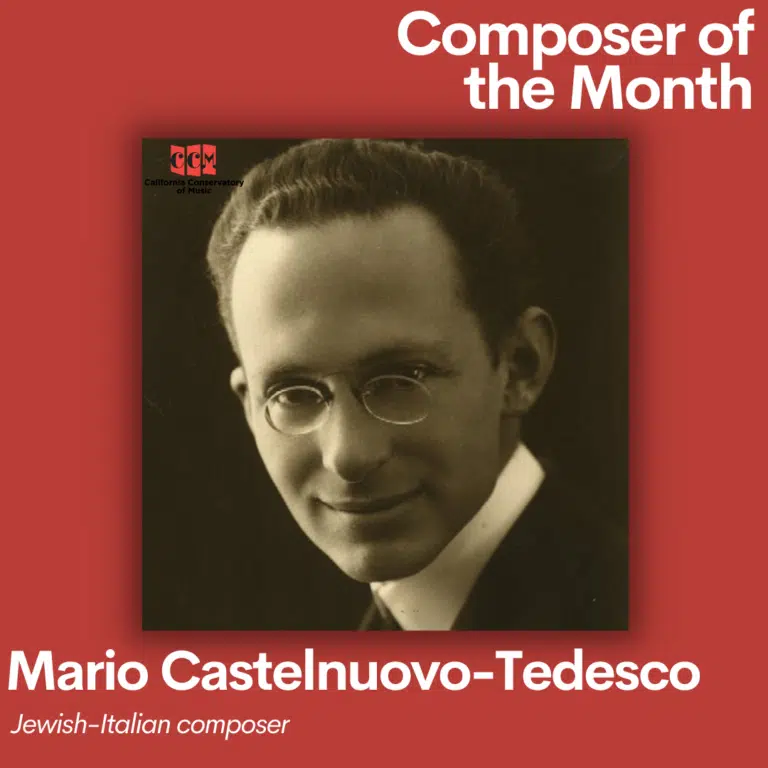May 1, 2023
Mario Castelnuovo-Tedesco: May Composer of the Month

Mario Castelnuovo-Tedesco was an Italian composer and guitarist born in Florence on April 3, 1895. He was known for his prolific output of compositions, including operas, ballets, film scores, and chamber music. He was also an accomplished guitarist and wrote numerous works that have since become staples of the guitar repertoire.
Early Life and Education
Castelnuovo-Tedesco was born into a Jewish family in Florence. He showed a talent for music at a young age and began composing when he was only nine years old. His father was a successful businessman and encouraged his son’s musical pursuits. His father made sure to provide him with the best music education available at the time. Castelnuovo-Tedesco studied composition with Ildebrando Pizzetti and Carlo Rossini at the Liceo Musicale. Meanwhile, he was also working towards his piano degree in Florence.
Composer Career
In the early 1920s, Castelnuovo-Tedesco moved to Rome, where he quickly established himself as a leading composer. He was one of the founders of the Società Italiana di Musica Contemporanea (Italian Society of Contemporary Music), an organization dedicated to promoting new music in Italy. Additionally, he was a member of the influential Roman School of composers, which included Respighi, Casella, and Malipiero.
Throughout his career, Castelnuovo-Tedesco wrote music in a variety of genres, including operas, ballets, choral works, chamber, and orchestral music. Some of his most well-known works include the operas La Mandragola and The Importance of Being Earnest, the ballets The Cypresses Believe in God and L’Amore delle Tre Melarance, and guitar concertos No. 1 and No. 2.
Additionally, Castelnuovo-Tedesco was a prolific composer of film scores, particularly during his time in Hollywood. He composed the scores for over 200 films, including several for the well-known film producer, David O. Selznick, such as the score for the 1939 film version of Wuthering Heights.
Guitar Music
Castelnuovo-Tedesco was a passionate advocate for guitar and wrote more than 100 works for the instrument. He was particularly interested in exploring the guitar’s potential as a solo instrument.
One of Castelnuovo-Tedesco’s most popular guitar works is his 24 Caprichos de Goya, a set of character pieces inspired by the etchings of the Spanish painter Francisco Goya. Furthermore, one of the most frequently performed guitar concertos is his Guitar Concerto No. 1 in D Major. He also wrote several sonatas for guitar and various chamber works featuring the instrument.
Moreover, Castelnuovo-Tedesco’s interest in the guitar was partly due to his friendship with the Spanish guitarist Andrés Segovia. The two met in Rome in the 1920s, and Segovia later commissioned several works from Castelnuovo-Tedesco, including the aforementioned Guitar Concerto No. 1.
United States Career
In 1939, Italy implemented anti-Semitic laws and Castelnuovo-Tedesco emigrated to the United States with his family. Then, he settled in Los Angeles and began working in the film industry, where he quickly established himself as a successful composer of film scores. Despite his success, he continued to write concert music. In fact, he wrote many of his most important works during this time, including his Concerto for Two Guitars and Orchestra, his Sonata for Violin and Guitar, and his String Quartet No. 8.
In Los Angeles, Castelnuovo-Tedesco became part of a vibrant community of émigré artists and intellectuals, including Igor Stravinsky, Arnold Schoenberg, and Thomas Mann. Also, he continued to collaborate with Segovia, who often performed his guitar works in concerts around the world.
Despite his success in the United States, Castelnuovo-Tedesco never forgot his roots in Italy. He maintained close ties with Italian musicians and continued to write music inspired by Italian culture, such as his operas Il Mercante di Venezia and The Merchant of Prato.
Legacy
Castelnuovo-Tedesco died in Los Angeles on March 16, 1968. He left behind a rich legacy of music that continues to be performed and studied today. His music is known for its lyricism, color, and expressive power, and his contributions to the guitar repertoire have helped to establish the instrument as a legitimate concert instrument.
Recently, there has been a renewed interest in Castelnuovo-Tedesco’s music, particularly his guitar works. In 2015, the Italian guitarist Andrea De Vitis released a recording of Castelnuovo-Tedesco’s complete works for solo guitar. Similarly, in 2018, the Italian label Brilliant Classics released a 14-CD box set of his complete guitar music performed by various artists.
Sign up for your free lesson at the California Conservatory of Music!

